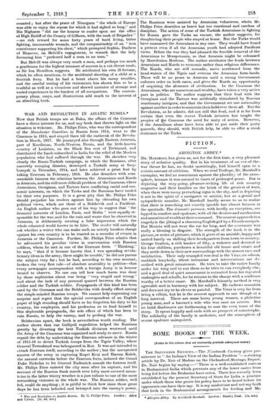FICTION.
ABINGTON ABBEY.•
MR. MARSHALL has given us, not for the first time, a very pleasant story of sedative quality. But in his treatment of an eve-of -the - war theme he has, no doubt unwittingly, laid himself open to a certain amount of criticism. When we read Trollop°, Mr. Marshall's exemplar, we feel no resentment against the placidity of the atmo- sphere, because it was natural to times of prolonged peace. But in depicting the easy-going, pleasure-seeking life of rich country magnates and their families on the brink of the greatest of wars, when there were many perturbing signs in the sky, and in depicting it not in the spirit of a castigator or satirist, but as a genial and sympathetic annalist•, Mr. Marshall hardly seems to us to realize that there is something not exactly ignoble but almost fatuous in the spectacle. The dramatis persona, with hardly an exception, are lapped in comfort and opulence, with all the devices and mechanism and amenities of wealth at their command. The nearest approach to a tragedyis the jilting of a charming English girl bye. French marquis. But Beatrix will not wear the rue for long, and the severance was really a blessing in disguise. The strength of tho book is in the picture, or series of pictures, which it gives of an amiable, happy and united family on shifting their headquarters from town to country. George Grafton, a rich banker of fifty, a widower and devoted to his four children, purchases a beautiful old house and estate and they settle down in their new surroundings with the utmost ease and satisfaction. Their only crumpled rose-leaf is the Vicar, an odious, snobbish busybody, whose intrusions and interventions are de- scribed with great minuteness. He tries to take the entire family under his wing and to run them as he tries to run everybody else, and a good deal of quiet amusement is extracted from his repeated onslaughts and rebuffs, for he returns to the charge with a resilience worthy of a better cause. Mr. Marshall's leisurely method is very agreeable and in harmony with his subject. Ho eschews sensation and does not try to be clever or painful. The Vicar is very far from being a villain, but he is the nearest approach to one though at a long interval. There are some horsy young women, a philistine young man, and a baronet's wife who was once an actress. But no lurid disclosures are forthcoming to mar the even tenor of the story. It opens happily and ends with no prospect of catastrophe. The solidarity of the family is unshaken, and the atmosphere of serene opulence unimpaired.


























 Previous page
Previous page